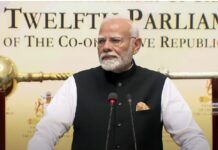“Under India’s G20 Leadership, Historic Global Consensus Achieved on DPI Definition, Framework, and Principles”: MoS Rajeev Chandrasekhar
“DPIs are a powerful mechanism for inclusion, especially for countries in the global south”: MoS Rajeev Chandrasekhar
“Countries that have lagged behind see this consensus as a way to follow India’s lead in DPIs”: MoS Rajeev Chandrasekhar
Union Minister of State for Skill Development & Entrepreneurship and Electronics & IT, Shri Rajeev Chandrasekhar interacted with the media today, where he discussed the significant outcomes of the Digital Economy Ministers’ Meeting that was held in August. He highlighted how In a historic move, under India’s Presidency, G20 Digital Economy Ministers reached a groundbreaking consensus on how to effectively shape digital public infrastructure (DPI) of the future.
Shri Rajeev Chandarsekhar said that the consensus between nations focused broadly in three key areas – Digital Public Infrastructure, Cybersecurity and Digital Skills.
“DPIs, for the first time ever, reached a global consensus and what ought to be their definition, framework, and principles. This is an exciting conversation that has gained momentum in the context of the G20. India is now a case study, as a nation that employed and deployed technological tools for progress and growth. Countries that have lagged behind increasingly see this as a way to follow India’s lead in DPIs, an open-source digital infrastructure, and using it to create the same impact that India has. Through these G20 conversations, we have further understood how DPIs are a powerful mechanism for inclusion, especially for countries in the global south,” the Minister said.
India has entered into eight Memorandums of Understanding (MoUs) with countries such as Armenia, Sierra Leone, Suriname, Antigua, Barbados, Trinidad and Tobago, Papua New Guinea, and Mauritius, offering them the India Stack and DPI at no cost and with open-source access. These nations now have the opportunity to adopt and utilize these resources within their borders, further developing their unique innovation ecosystems.
Apart from DPIs, the minister spoke about how nations have prioritized cybersecurity as well, emphasizing its importance for a fast-paced growing economy. Shri Rajeev Chandrasekhar said, “On cybersecurity, the G20 digital economy ministers have had wide-ranging discussions on why it is important for businesses to be protected. Cybersecurity is an important issue for all countries in the world because the digital economy is becoming an increasingly larger component of economic progress and the global economy.”
The third point of consensus was digital skills. The Minister said that in a post-COVID digital world, it is necessary for nations to ensure that digital skills are taught and nurtured among the youth.
“Digital skills are increasingly needed in this post-COVID digital world. India’s talents are focused on creating digital skills for our youth. This is something that has resonated during this discussion. Many countries are interested in partnering with each other and with India to create digital-ready, future-ready skill talent to deal with the ongoing challenges in the coming techade,” Shri Rajeev Chandrasekhar further added.
















